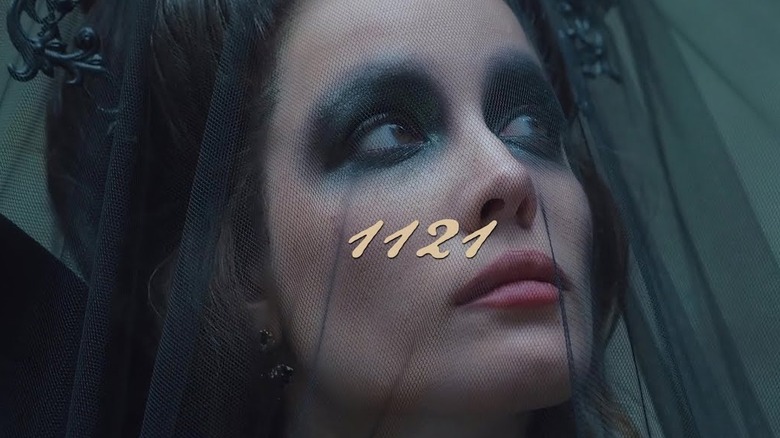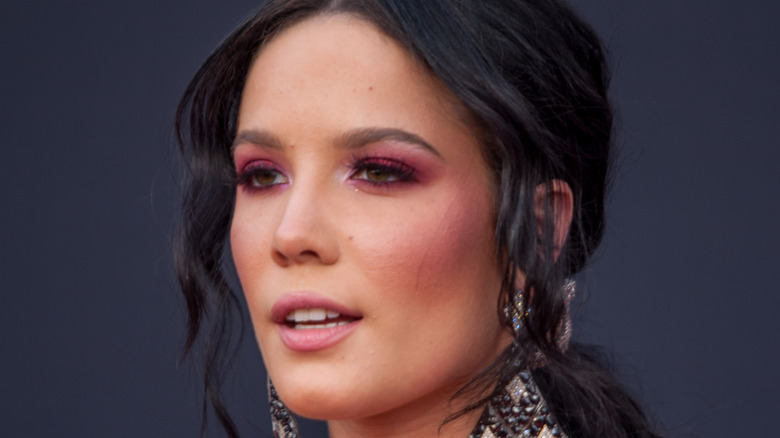The Real Meaning Of 1121 By Halsey
Halsey put her artistry on full-display on her latest project "If I Can't Have Love, I Want Power." The chart-topping musician is coming off the biggest album rollout of their career with a full-length film accompanying her new music. Both the "If I Can't Have Love, I Want Power" album and film explore Halsey's many emotions about her biggest accomplishment yet — becoming a parent.
Halsey, whose pronouns are "she/they," revealed their pregnancy with an adorable photoshoot on Instagram in January. Halsey and partner Alev Aydin welcomed "rainbow" baby Ender Ridley in July, after the singer's longtime struggle with infertility caused by endometriosis, per People.
Halsey described her latest project as a "concept album about the joys and horrors of pregnancy and childbirth" when revealing the album artwork on Instagram. Songs on "If I Can't Have Love, I Want Power" — and the accompanying dark themes of their film — dive into Halsey's complex emotions about their journey to becoming a mom. Halsey's song "1121" in particular holds a special meaning to the star.
Halsey sings about early pregnancy on 1121
The pop star revealed their track "1121" commemorates the date November 21, 2020 — the day Halsey found out she was pregnant. "I was really sick and I thought that I had COVID," Halsey said of her experience that day in an August 27 Instagram live. "But I was just pregnant," she laughed. In a tweet commemorating the date's anniversary, Halsey called November 21 a "very nostalgic day indeeeeeed."
"I won't die for love / But ever since I met you / You could have my heart / And I would break it for you," Halsey sings about their love for her future child on "1121." While Halsey expresses she's head over heels for her baby in the "1121" lyrics, the song also goes deeper into her pregnancy journey. Halsey described the context of the song in her film in a tweet. "It's the funeral scene in the movie because it was the moment I buried my past trauma in favor of a better future," Halsey said.
The pop star's road to pregnancy was indeed traumatic, as she revealed in an interview with Rolling Stone that they suffered a miscarriage almost immediately before performing on stage in 2016. "It's the angriest performance that I've ever done in my life," Halsey recalled of her miscarriage to Rolling Stone. On "1121," Halsey expresses their fear of suffering another pregnancy loss, singing: "Please don't leave (I'm runnin' out of time to tell you) / Don't leave me in the shape you left me."
Halsey's fertility issues inspire her music
Halsey has drawn musical inspiration from her infertility in previous songs. According to the album notes on Halsey's record "Manic," Halsey's song "More" divulges her heartbreaking experience with miscarriage, per Apple Music. The track is a love song to Halsey's future baby amid her struggles to conceive at the time.
Halsey described her miscarriage experience as "the most inadequate" they had ever felt to The Guardian in 2020. "Here I am achieving this out-of-control life, and I can't do the one thing I'm biologically put on this earth to do," they said.
Halsey updated fans in 2017 that she "braved multiple terrifying surgeries" to treat her endometriosis in the hopes of bearing a child one day, per People). "For a long time, I didn't think that having a family was something I was going to be able to do, and it's very, very important to me," Halsey explained on their "Manic" album notes. "Then one day my OB-GYN tells me it's looking like I maybe can, and I was so moved." After years of struggling, Halsey is finally onto a new chapter she has always hoped for.



